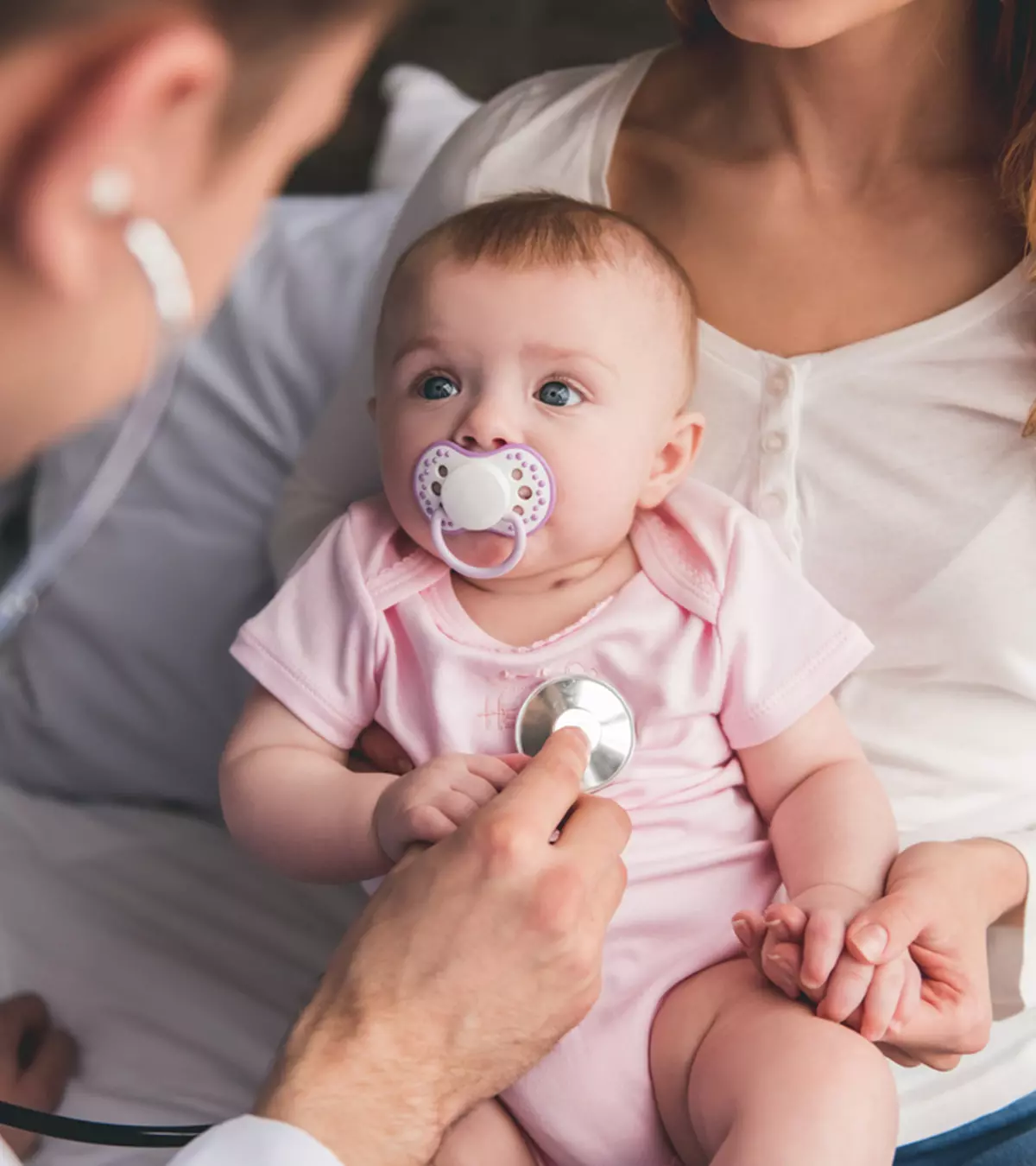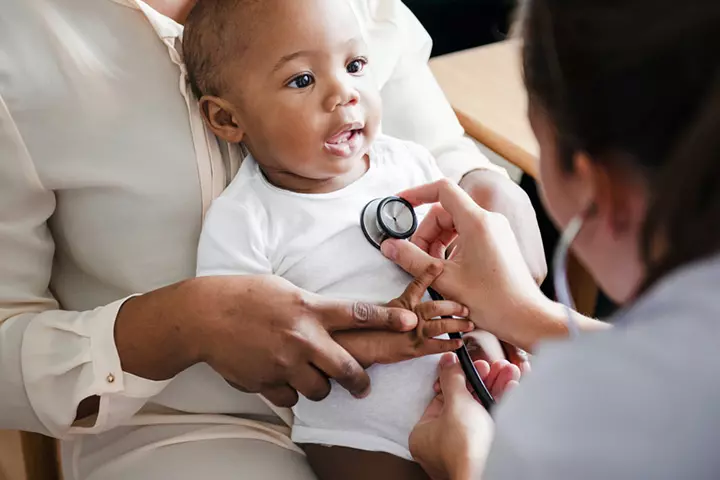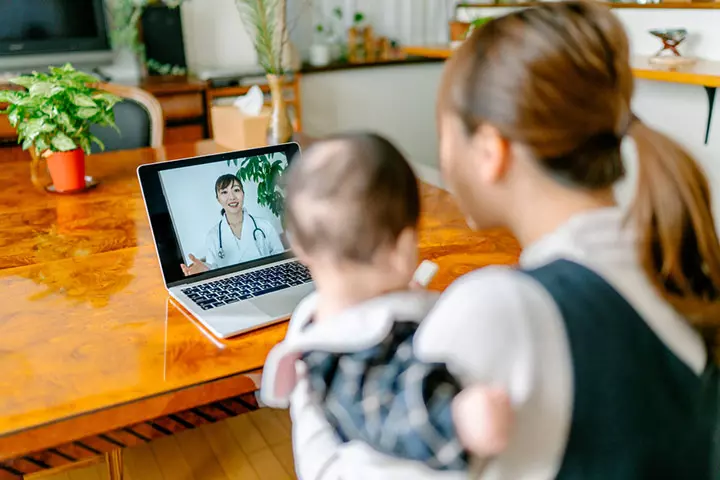
Image: Shutterstock
A few days back, I woke up in the middle of the night to my baby’s screams only to find her winching in pain and discomfort. She was covered in rashes around her chest and stomach. There were even a few on her face. It was worrisome because the doctor’s appointment we had the previous week confirmed that she was in the pink of health. I was worried that it could be something serious as I hadn’t seen anything like that before.
My baby suffered throughout the night, scratching herself (only to make matters worse) as the doctor wasn’t available on call. She was mildly feverish too. I was worried but didn’t want to overthink and arrive at any conclusions until I had the view of an expert. So, I let the night go by as I tried soothing her, frantically praying that these red rashes on her body would magically disappear. Believe me it was a long night and I could really feel my little one’s pain.
The following day, we consulted with a pediatrician, who offered her some medications and assured me that it was harmless. He confirmed it was an allergic reaction that would go away. It didn’t. So, my motherly instincts and fears got the best of me, and I decided to opt for a second opinion — and thank god, I did! And this is why I believe you ought to take a second opinion too if things just don’t feel right or if you are not confident about the doctor’s opinion. Doctors, like everyone else, are humans too, and it is possible that at times they fail to detect a particular symptom or pass it off as something else.
I decided to speak to a skin specialist to accurately diagnose what could have triggered the symptoms. I was convinced that immediate intervention was necessary to provide some relief for my little one. The skin specialist was patient and seemed far more aware of skin issues that commonly affect children around my baby’s age. As the doctor ran a thorough checkup, she concluded that my baby had a Scarlet fever, a rare bacterial skin condition that affects children. She conducted other tests and procedures such as a throat culture and a rapid antigen test, to be doubly sure. In a few days, we had official confirmation that my baby was suffering from Scarlet fever, which results from an enlargement of lymph nodes (1). Now that we had confirmation and knew what was causing the body rashes, half the battle was won. It indeed helped ease my anxiety a bit, but I needed my baby to be treated so I could see her brimming with happiness all over again. The doctor prescribed antibiotics, and after a few weeks, the rashes vanished. So, my experience with a second medical opinion for my baby did prove worthwhile.
1. When Should You Get A Second Opinion?

Image: Shutterstock
Yes, doctors are our saviors, and we are grateful they exist. But science is not without its weaknesses, especially the ones that are caused due to errors in human judgment. If your instinct urges you to find a better solution, you have the right to do it. No, it’s not an insult, mistrust, betrayal, or disregard to your go-to doctor but having a second opinion with a specialist just shows that you can take matters into your own hands when required. This is because the field of medicine is vast and doctors have different specializations. Each specialization may have different ways of approaching or diagnosing an issue and consulting more than one doctor can increase the chances of diagnosing a disease that is lurking secretly. There is nothing wrong in wanting to confirm and know exactly what is causing the issue and be sure about it.
2. How Can A Second Opinion Help?

Image: Shutterstock
A second opinion is another layer of confirmation. Sometimes, it helps dissect additional causes of a medical condition by a specialist who can give you more clarity with their knowledge, experience, and expertise. Haven’t we ourselves solved problems in our lives by taking a different approach or applying a different perspective? Even in medicine, a different outlook or approach might help in nailing down the real cause of the problem. So, it helps, but it is good to do it in a way where you do not offend your doctor, especially if they have been around caring for your child since the beginning.
3. How Can You Seek A Second Medical Opinion Without Causing Hard Feelings?

Image: IStock
It’s always best to tell your doctor about your concerns and the necessity of having a second opinion, lest they should know of it from a familiar network circle and harbor bitter feelings or resentment. You should talk to your doctor with confidence and let them know where your mind is at. You can even ask your current doctor’s opinion on which specialist to refer to and whether it is advisable to go for a second opinion. Taking them in your confidence will make them respect your decision and chances are that they themselves will recommend another doctor for you.
However, if you have lost all faith in your doctor, it’s best to find someone you are more comfortable around. One good thing about letting your doctor know that you will be taking another opinion is that you will likely get the appointment booked sooner if they make a call. They can also refer you to the best doctors for the problem, which will save you time, energy, and effort. It will also save you all the stress of going behind your doctor’s back and even help your doctor stay involved during the diagnosis and subsequent treatments.
Like all parents, you are driven by the need to ensure your child’s wellbeing, and if the financial variables allow, you’ll go for it. After all, you just want your child to outgrow a problem and relieve themselves of any irritation or pain. You will do what you think you should do. If your child is content and happy, the whole family is happy. And, your doctor will be too! Do you feel the same about second medical opinions? Share your thoughts with us in the comments below!
References
- Scarlet Fever
https://www.ncbi.nlm.nih.gov/books/NBK507889/
Community Experiences
Join the conversation and become a part of our nurturing community! Share your stories, experiences, and insights to connect with fellow parents.












